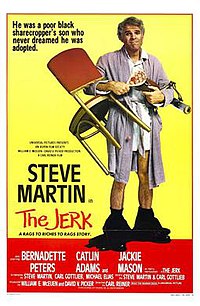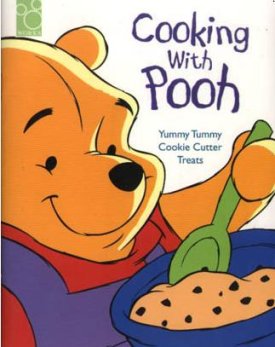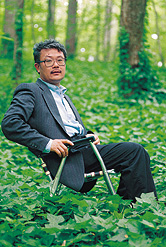 Renaissance comedian Steve Martin is set to warp the minds of li'l jerks everywhere with his upcoming children's book, The Alphabet From A to Y, With Bonus Letter Z. Hopefully, this book resembles Martin's 2001 novella, Shop Girl, more than it does his recent children's movies. They all sucked.
Renaissance comedian Steve Martin is set to warp the minds of li'l jerks everywhere with his upcoming children's book, The Alphabet From A to Y, With Bonus Letter Z. Hopefully, this book resembles Martin's 2001 novella, Shop Girl, more than it does his recent children's movies. They all sucked. Southern Californian booksellers are either eager to defy all of the slacker/beach bum stereotypes normally associated with their peeps, or they're just plain suicidal. Via Publisher's Weekly: SoCal Publishers and Booksellers Work as Fires Abate. Hell, I took a week off during Hurricane Katrina -- and The Inkwell's located in Massachusetts!
Southern Californian booksellers are either eager to defy all of the slacker/beach bum stereotypes normally associated with their peeps, or they're just plain suicidal. Via Publisher's Weekly: SoCal Publishers and Booksellers Work as Fires Abate. Hell, I took a week off during Hurricane Katrina -- and The Inkwell's located in Massachusetts! A signed, first edition of Harry Potter and the Philosopher's Stone sold in London for $40,000 (US). I'm assuming that this purchase was made as an investment, because what person able to drop $40K on a book would be such a remedial reader that they'd claim Potter be their favorite book? Oh, wait, I know.
A signed, first edition of Harry Potter and the Philosopher's Stone sold in London for $40,000 (US). I'm assuming that this purchase was made as an investment, because what person able to drop $40K on a book would be such a remedial reader that they'd claim Potter be their favorite book? Oh, wait, I know.
Friday, October 26, 2007
Book News, In Brief
Thursday, October 25, 2007
Book News, In Brief
 Via BoingBoing.net: Possibly the worst cookbook title ever. Disney's kidding, right? I mean, they 'd have to be...right?
Via BoingBoing.net: Possibly the worst cookbook title ever. Disney's kidding, right? I mean, they 'd have to be...right? The Rowling credo: If at first you do succeed -- beyond even you and your publisher's wildest dreams -- try and try again.
The Rowling credo: If at first you do succeed -- beyond even you and your publisher's wildest dreams -- try and try again. MySpace has long inspired/housed reams of bad writing. Now they're teaming with publisher HarperCollins to release a book -- featuring none of it. Sorry, all you LonelyGrrl6969s of the world wide web. You're still just a bunch of unrecognized, unpublished nobodies. (Our tip? Blog about it!)
MySpace has long inspired/housed reams of bad writing. Now they're teaming with publisher HarperCollins to release a book -- featuring none of it. Sorry, all you LonelyGrrl6969s of the world wide web. You're still just a bunch of unrecognized, unpublished nobodies. (Our tip? Blog about it!)
Wednesday, October 24, 2007
Wired Does Manga

The newest issue of Wired Magazine (and their accompanying website) has dedicated quite a bit of space this month to manga (or, Japanese comics). As a primer for the uninitiated, there's a colorful, comics f.a.q. describing the global phenomenon, and another, longer comic mapping manga's slow-building popularity boom here in the United States. For the more experienced manga reader (those of you who know enough to read your manga trades starting at the back page, right side), there's a fascinating article on the way that dojinshi (or, unlicensed and self-published fan adaptations) has evolved into a multi-million dollar a year business...and one that the corporate copyright holders are allowing to exist! Apparently, the Japanese comics corporations are willing to turn a blind eye to the dojinshi scene, understanding that it serves as a sort of training school for many of the artists and writers that they will one day be employing. The comics companies also seem to feel that the fan-fic "does not diminish the sales of the original product, but may increase them."
Hmn...do you think that J.K. Rowling and Scholastic would take such an enlightened and understanding view if the reams of Harry-humps-Ron stories currently floating around the internet started being published via print-on-demand?
(thanks to BoingBoing.net for the initial heads-up!)
Posted by
Inkwell Bookstore
at
12:07 AM
![]()
Labels: comic book news
Tuesday, October 23, 2007
Author Du Jour: Ha Jin
Biography
(courtesy of bookreporter.com) Born in mainland China, Ha Jin grew up in a small rural town in Liaoning Province. From the age of fourteen to nineteen he volunteered to serve in the People's Liberation Army, staying at the northeastern border between China and the former Soviet Union. He began teaching himself the middle-and high-school courses since his third year in the army, which he left in the sixth year because he wanted to go to college. But colleges remained closed during the Cultural Revolution, which continued when he was demobilized, so he worked as a telegrapher at a railroad company for three years in Jiamusi, a remote frontier city in the Northeast. During this time, he began to follow the English learner's program, hoping that someday he could read Friedrich Engels' The Condition of the Working Class in England in 1844 in the English original.
Born in mainland China, Ha Jin grew up in a small rural town in Liaoning Province. From the age of fourteen to nineteen he volunteered to serve in the People's Liberation Army, staying at the northeastern border between China and the former Soviet Union. He began teaching himself the middle-and high-school courses since his third year in the army, which he left in the sixth year because he wanted to go to college. But colleges remained closed during the Cultural Revolution, which continued when he was demobilized, so he worked as a telegrapher at a railroad company for three years in Jiamusi, a remote frontier city in the Northeast. During this time, he began to follow the English learner's program, hoping that someday he could read Friedrich Engels' The Condition of the Working Class in England in 1844 in the English original.
In 1977 colleges reopened, and he passed the entrance exams and went to Heilongjiang University in Harbin where he was assigned to study English, even though this was his last choice for a major! He received a B.A. in English in 1981. He then studied American literature at Shandong University, where he received an M.A. in 1984. The following year he came to the United States to do graduate work at Brandeis University, from which he earned a Ph.D. in English in 1993. In the meantime, he studied fiction writing at Boston University with the novelists Leslie Epstein and Aharon Appelfeld.
After the Tianeman massacre, he realized it would be impossible to write honestly in China, so he decided to emigrate. Unlike most exiled writers already established in their native language, Ha Jin had no audience in Chinese, and so chose to write in English. To him, this meant much labor, some despair, and also, freedom.
Currently he is an associate professor in English at Emory University. He has published two volumes of poetry, BETWEEN SILENCES (University of Chicago Press, 1990), and FACING SHADOWS (Hanging Loose Press, 1996), and two books of short fiction, OCEAN OF WORDS (Zoland Books, 1996) which received the PEN Hemingway Award, and UNDER THE RED FLAG (University of Georgia Press, 1997), which received the Flannery O'Connor Award for Short Fiction and was a finalist for the Kiriyama Pacific Rim Book Award. He also published a novella, IN THE POND (Zoland Books, 1998), which was selected as a best fiction book of 1998 by the Chicago Tribune. His short stores have been included in The Best American Short Stories (1997 and 1999), three Pushcart Prize anthologies, and Norton Introduction to Fiction and Norton Introduction to Literature, among other anthologies. WAITING Ha Jin's first full-length novel, is the winner of the 1999 National Book Award for Fiction and the 2000 PEN/Faulkner Award for Fiction, and a finalist for the Los Angeles Times Book Award for fiction. He has also written a collection of stories called, THE BRIDEGROOM, published by Pantheon Books.
An Interview with Ha Jin by Chris GoGwilt
(courtesy of guernicamag.com)
Chris GoGwilt: Can you recall when you knew you were going to become a writer? Perhaps a defining moment in your five years of service in the Chinese army?
Ha Jin: In the Chinese army we did write a lot, but we mainly produced propaganda. I didn't think I wanted to be a writer at the time. I finished the poetry manuscript [for Between Silences] at the end of 1988 and soon that manuscript was accepted for publication, but even at that time I was not serious [about writing] because I thought I would return to China. But later, because of the Tiananmen Massacre, I could not return, and I had to figure out how to survive. I had a few friends who were teaching writing, had a few books under their belt, and I thought that if I continued to write, maybe if I published another three books, I might get a decent job. I asked my wife, "Can you wait for me eight or nine years?” And she said, "Okay."
For a long time I couldn't decide whether to write in English because I knew there was this tradition: Conrad and Nabokov, those giants there.
Chris GoGwilt: You say you were not serious, even when you published Between Silences, but in that book, in the prologue, you make a very eloquent statement about your commitment as a writer.
Ha Jin: I said that, as a fortunate person, I wanted to speak for those unfortunate people who had created history, but at the same time were fooled by history. But that was not the kind of ambition a writer in my situation could fulfill because I didn't plan to write in English. What I meant at the time was just for that book.
Chris GoGwilt: Clearly Tiananmen Square dramatically altered things for you. How did that change your sense of commitment as a writer? Ha Jin: I served in the Chinese army, and the army was called The People's Army, so we were from the people and supposed to serve the people and protect the people. I was shocked that the field armies would go into the city and really suppress civilians. Then my son arrived. That was a turning point. It was clear that he would be an American. At the airport, at the sight of him, I thought of his future. For me it was not clear, but for him to be an American, that also implied that I would have to stay for many years. Forget about the commitment. I realized there was nothing of that kind anymore: no grandeur, no rhetoric anymore.
Ha Jin: I served in the Chinese army, and the army was called The People's Army, so we were from the people and supposed to serve the people and protect the people. I was shocked that the field armies would go into the city and really suppress civilians. Then my son arrived. That was a turning point. It was clear that he would be an American. At the airport, at the sight of him, I thought of his future. For me it was not clear, but for him to be an American, that also implied that I would have to stay for many years. Forget about the commitment. I realized there was nothing of that kind anymore: no grandeur, no rhetoric anymore.
Chris GoGwilt: No speaking for the oppressed or speaking for the silenced people?
Ha Jin: Certainly what I faced was a matter of survival. Once I decided to stay in the States, I had to start a different kind of life, as an individual like everybody else.
Chris GoGwilt: So in a sense you're saying that the moment when you really found that you had to write was when you discovered that your son was committed to America, not yourself?
Ha Jin: Yes. But at the same time it was a matter of existence, not just to bring food to the table. I really wanted to make the best use of my life, and one thing I discovered… for a long time I couldn't decide whether to write in English because I knew there was this tradition: Conrad and Nabokov, those giants there. There was a well-known Russian critic who wrote to Chekhov. At the time Chekhov was not writing his most ambitious work, but just stories for newspapers. And the critic said, "You know, you should cherish your talent, and you should be more ambitious. You should write in more complicated forms." At the end of the letter, the critic said, "I don't know about your income. If it's small, starve. We all started that way." But I realized that in the United States, that might not happen. As long as you are in good health, and you do some work, you can survive.
When a writer adopts another language there are a lot of motivations: necessity, ambition, estrangement.
(This interview is continued here.)
Bibliography
Between Silences (poetry) (1990)
Facing Shadows (poetry) (1996)
Ocean of Words (short stories) (1996)
Under the Red Flag (short stories) (1997)
In the Pond (novel) (1998)
Waiting (novel) (1999)
The Bridegroom (short stories) (2000)
Wreckage (poetry) (2001)
The Crazed (novel) (2002)
War Trash (novel) (2004)
A Free Life (novel) (forthcoming November 2007)
Posted by
Inkwell Bookstore
at
12:33 AM
![]()
Labels: author profiles
Monday, October 22, 2007
Book News, In Brief
 Donald Trump may be an arrogant and questionably intelligent pseudo-businessman, but he sure knows how to promote a book signing in a way that appeals to non-readers and cheap sonuvab**ches everywhere. This past week, in an effort to garner headlines/promote his new book, Think Big and Kick Ass in Business and Life, Trump offered New York's huddled masses yearning to receive something for free varying amounts of cold, hard cash if they would just show up. According to TheTimes.co, the first 100 people in line were given a $100 bill. The next 200 people got $50 each, and the next 1000 people got $10 each. A total of $30,000 given away. What sort of idiot stands in line for (a.) the chance to 'meet' Donald Trump or (b.) ten lousy bucks?
Donald Trump may be an arrogant and questionably intelligent pseudo-businessman, but he sure knows how to promote a book signing in a way that appeals to non-readers and cheap sonuvab**ches everywhere. This past week, in an effort to garner headlines/promote his new book, Think Big and Kick Ass in Business and Life, Trump offered New York's huddled masses yearning to receive something for free varying amounts of cold, hard cash if they would just show up. According to TheTimes.co, the first 100 people in line were given a $100 bill. The next 200 people got $50 each, and the next 1000 people got $10 each. A total of $30,000 given away. What sort of idiot stands in line for (a.) the chance to 'meet' Donald Trump or (b.) ten lousy bucks? After stealing a page or two from the Micheal Jackson Book of Promotional Touring , J.K. Rowling managed to top her recent controversies by announcing that the fictitious wizard Dumbledore is fictitiously gay. (In related news, Jackson continues to deny similar accusations, while the gay community continues to decry the moral values of the straights for allowing a wacko such as Jacko to claim membership in their ranks.)
After stealing a page or two from the Micheal Jackson Book of Promotional Touring , J.K. Rowling managed to top her recent controversies by announcing that the fictitious wizard Dumbledore is fictitiously gay. (In related news, Jackson continues to deny similar accusations, while the gay community continues to decry the moral values of the straights for allowing a wacko such as Jacko to claim membership in their ranks.) Jonathan Demme, the film director who outfitted David Byrne in the giant, white suit and served Hannibal Lechter a dinner of brains 'with fava beans and a nice Chianti,' is now helping Jimmy Carter to translate his book, Palestine: Peace Not Apartheid, into a movie. Link
Jonathan Demme, the film director who outfitted David Byrne in the giant, white suit and served Hannibal Lechter a dinner of brains 'with fava beans and a nice Chianti,' is now helping Jimmy Carter to translate his book, Palestine: Peace Not Apartheid, into a movie. Link The Comics Reporter has posted a great interview that they did with Charles Brownstein regarding the Comic Book Legal Defense Fund (it's the ACLU for funny page folk). Recently, the CBLDF changed the line up of their board of directors to include a number of names that once were associated with, if not outright censorship, at least a stance that was not wholly on the side of unencumbered artistic expression. Interesting stuff.
The Comics Reporter has posted a great interview that they did with Charles Brownstein regarding the Comic Book Legal Defense Fund (it's the ACLU for funny page folk). Recently, the CBLDF changed the line up of their board of directors to include a number of names that once were associated with, if not outright censorship, at least a stance that was not wholly on the side of unencumbered artistic expression. Interesting stuff.



